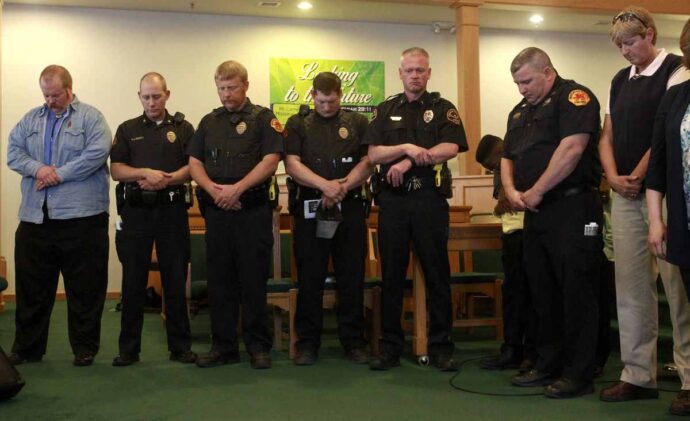Tomorrow night, as we head into the home stretch of Lent rounding the corner to Easter, members of my congregation and I will gather for an agape meal. It’s not a seder, but an intimate eucharistic worship service wrapped around a dinner party in a liturgy that’s about as close to the actual practices of the Last Supper as we can get. It’s a time to remember the love of Jesus Christ passed on to his followers, instituted in his words to his few closest disciples:
I give you a new commandment: create a honking big church and school with its own police force. Do this in memory of me.
On second thought, I can’t actually find that in my New Testament. Perhaps it’s somewhere in the back? Or do they use a different Bible down in Alabama?
The Alabama Senate has voted to allow a church to form its own police force.
Lawmakers on Tuesday voted 24-4 to allow Briarwood Presbyterian Church in Birmingham to establish a law enforcement department.
The church says it needs its own police officers to keep its school as well as its more than 4,000 person congregation safe.
Critics of the bill argue that a police department that reports to church officials could be used to cover up crimes.
The state has given a few private universities the authority to have a police force, but never a church or non-school entity.
Police experts have said such a police department would be unprecedented in the U.S.
A similar bill is also scheduled to be debated in the House on Tuesday.
Briarwood is a member church of the conservative fundamentalist Presbyterian Church in America (which shouldn’t be confused with the much larger liberal mainline denomination, PCUSA); in fact, the PCA’s founding meeting was held at Briarwood. The Alabama Legislature passed a similar bill in 2015, but then-Gov. Robert Bentley refused to sign it, citing concerns “the bill could open the door to private police forces statewide.”
You know a bill has to be bad if an active Southern Baptist Bible Belt governor refuses to sign the thing. The latest attempt hasn’t made it to the new governor’s desk, and you might think that she wouldn’t want to approve it this early in her tenure, but astonishingly, it already wouldn’t even be the worst thing she signs. Via Charlie Pierce, we hear
One of [Kay Ivey’s] first acts was to sign a bill removing judicial discretion in death penalty cases because nothing says, “Roll, Tide” like icing a few convicts—and the state just couldn’t get that thing right.
In the middle of Holy Week, seven days dedicated to the story of a man slowly making his way to an inevitable execution by state authority, she signs a bill making it easier to apply the death penalty. Christian!
![]() Enter to win a $50 Amazon gift card!
Enter to win a $50 Amazon gift card!
Click HERE to take our 2-minute reader survey.
If you’re keeping score at home, the story so far is that the Alabama Legislature is trying to allow an individual megachurch to establish its own police force. It was blocked once by a governor who has since been brought down by one of the largest—and weirdest—sex-and-corruption scandals the U.S. has seen in a long time. The bill will almost certainly make its way back to the new governor, who apparently knows no shame, so it might actually become law, and congratulations! Briarwood, you now have your very own Jesus-flavored goon squad.
You might think this is enough to establish this as a terrible story. Sadly, you would be wrong. There’s more:
The talk began weeks – now months ago. Parents at Briarwood Christian High School began to call and write about a drug raid at the school. Students were identified and cell phones seized. It was marijuana we heard, and LSD and even heroin, right there in the school that describes its “compelling trait” as a climate “where students are spiritually and intellectually equipped to serve Christ.”
Drugs. Imagine.
Parents begged for answers and so did we. At least half a dozen messages to Superintendent Barrett Mosbacker went unanswered. Others at the school said Mosbacker was the only one who could comment, and the Shelby County Sheriff’s office said there was nothing the department could talk about.
Silence. Nothing to see here.
Because we are to pretend drugs don’t exist in the affluent zip codes, because drug abuse cannot be acknowledged in the pursuit of the Christ-centered life. Because everybody is better off if we pretend that problem is … somebody else’s problem.
This is from April 2015, before the original bill was considered in the Alabama Legislature. To recap once again: the Briarwood high school was caught trying to sweep a drug problem under the rug, and its response was to suggest to state lawmakers that maybe it should have its own police.
It’s Holy Week, and my sarcasm is failing me, but I think the issues here are pretty clear. Giving a religious entity law-enforcement powers is disturbing enough, but there’s also the well-founded concern that a private police force—whether religious or secular—is in a position to enforce laws or cover up transgressions as it feels convenient. Say, for example, making sure that kids from well-heeled families aren’t going to jail for using drugs on campus.
On Good Friday, my congregation will remember the suffering and death of a poor man whose few remaining friends deserted him as he was arrested by religious police, then turned over to civil authorities for a show trial and execution. Presumably, the people at Briarwood Presbyterian will do the same thing. How much of that story will sink in with them is uncertain.





